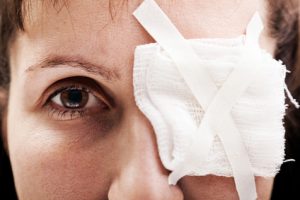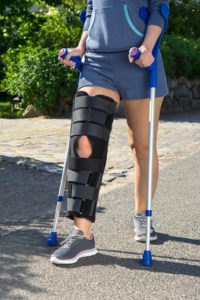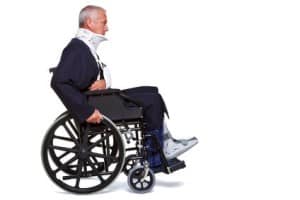Injuries Covered by Workers’ Compensation in Georgia
Most people think that Georgia workers’ compensation law covers “work-related” injuries. This is generally true.
Workers’ compensation probably covers you if you get hurt at work. But some insurance companies deny workers’ compensation claims even when an injury happens at work while you are doing your job.
Like any part of the law, there are some confusing technicalities. Georgia law requires an insurance company to pay workers’ compensation benefits when an employee suffers an injury by accident arising out of and in the course of employment. An insurance company may try to use these technicalities against you.
In most cases, you should receive a form from the insurance company within about three weeks of your injury telling you that your claim has been accepted or denied. If the insurance company sends you a form saying they have denied your claim as not covered by workers’ compensation, it does not end your case. Do not get discouraged.
Many people receive workers’ compensation benefits after the insurance company denies their claim. Georgia’s workers’ compensation law gives you the right to request a hearing and prove your case in court.
What Workplace Injuries Are Covered?
In Georgia, workers’ compensation covers a broad range of injuries to ensure employees receive necessary medical care and financial support while they recover. The system pays benefits to workers when they are injured on the job, which helps to cover medical expenses, ongoing care, physical rehabilitation costs, and lost wages during recovery. Here’s a detailed look at the types of injuries typically covered.
Physical Injuries
Physical injuries are the most common type covered under workers’ compensation. These work-related injuries can vary greatly in severity and impact on the worker’s ability to perform their duties. Examples of covered injuries include:
- Traumatic Injuries: These are acute injuries that occur suddenly due to accidents such as slips, trips, and falls. They can result in broken bones, cuts, burns, or bruises. For instance, a worker might slip on a wet floor and break a leg or suffer a burn from a chemical spill.
- Repetitive Stress Injuries: These injuries develop over time due to repetitive tasks that strain certain parts of the body. Conditions like carpal tunnel syndrome, tendonitis, and bursitis are common in occupations requiring repetitive motions, such as typing, assembly line work, or manual labor involving repetitive lifting.
- Back and Neck Injuries: These injuries often result from lifting heavy objects, vehicle accidents, poor ergonomics, or falls. They include strains, sprains, herniated discs, and chronic back pain. Such injuries can affect mobility and the ability to perform daily tasks.
- Head Injuries: Concussions or traumatic brain injuries can occur from falls or being struck by objects. These injuries are particularly serious as they can lead to long-term cognitive and physical impairments.
Occupational Diseases
Certain illnesses that arise due to workplace conditions are also covered under workers’ compensation. These diseases often develop due to prolonged exposure to hazardous substances or environments. Examples of diseases that may qualify for benefit payments include:
- Respiratory Diseases: Conditions like asthma, chronic bronchitis, or occupational lung disease can result from exposure to harmful substances such as dust, fumes, chemicals, or asbestos at work. Workers in construction, mining, or manufacturing are particularly at risk.
- Skin Conditions: Occupational dermatitis, rashes, or other skin issues can be caused by repeated exposure to chemicals, solvents, or irritants. Workers in industries like cleaning, healthcare, or manufacturing often encounter these risks.
- Hearing Loss: Continuous exposure to loud noises in the workplace can lead to permanent or temporary hearing damage. This is common in industries like construction, manufacturing, and music production, where workers are exposed to high decibel levels regularly.
Aggravation of Pre-existing Conditions
Workers’ compensation in Georgia also covers situations where a pre-existing condition is aggravated or worsened by a work-related activity. For example, if an employee has a history of back problems and a workplace incident exacerbates this condition, the additional medical treatment and any related lost wages may be covered by benefit payments.
Mental and Emotional Injuries
In certain circumstances, psychiatric disorders and mental health issues can be covered if they are related to a physical injury sustained at work. Examples of these types of injuries include:
- Stress or Anxiety: These conditions may arise following a traumatic physical injury. For instance, a worker who has suffered a severe occupational injury might develop anxiety related to returning to the workplace.
- Depression: This can occur after a serious workplace accident, particularly if the job-related injury leads to significant lifestyle changes or prolonged recovery periods.
Injuries During Work-Related Activities
Workers’ compensation covers injuries that occur while performing job duties, even if they happen away from the primary worksite. This includes:
- Off-site Work: Compensation coverage can cover injuries sustained while attending work-related events, meetings, or training sessions. For example, if an employee is injured during a business conference, they are eligible for workers’ compensation.
- Traveling for Work: Accidents occurring while on a business trip or running work-related errands are also covered. This includes car accidents while driving to a client meeting or injuries sustained while performing job tasks off-site.
Cumulative Trauma
Cumulative trauma injuries develop over time due to continuous strain or stress on the body. These injuries can be just as debilitating as acute injuries and include:
- Chronic Pain: Persistent back pain from years of improper lifting while working can be covered. This type of on-the-job injury often requires ongoing medical treatment and physical therapy.
- Joint Injuries: Conditions like arthritis or bursitis in the knees, shoulders, hips, and elbows can result from repetitive tasks. Workers in physically demanding jobs, such as construction or warehouse work, are particularly susceptible to these injuries.
What benefits will I receive if my claim is accepted?
If you win your case or if the insurance company agrees to accept it, Georgia workers’ compensation law provides three basic types of benefits to employees.
- Lost wage benefits (temporary total disability or temporary partial disability): Partial wage replacement if the occupational injury prevents the worker from returning to their job immediately. These weekly wage payments help to alleviate financial stress during the recovery period.
- Medical benefits: Compensation coverage for all necessary medical treatments, including doctor visits, hospital stays, medications, and physical therapy. This ensures all necessary medical costs are covered until you achieve medical improvement.
- Benefits for a permanent disability (permanent partial disability benefits): Compensation if the injury results in lasting impairments that affect the worker’s ability to perform their job or daily activities. These benefits are reserved for permanent injuries.
Get a Free Consultation From a Georgia Workers’ Compensation Lawyer
At Perkins Studdard, we have helped many injured workers in Georgia win the benefits they need and deserve. Please take a look at the information below if you would like to know more about what Georgia workers’ compensation covers. Also, be sure to look around the rest of our site to find out more information about particular areas of workers’ compensation.
If you have specific questions about your case or the workers’ compensation process in general, you can always call at (770) 285-0548 or contact us by email. An experienced attorney will be happy to provide you with a no-obligation, free consultation.
NEED HELP?
Call 770.214.8885
Navigating Georgia’s workers’ compensation system can be a daunting task, leaving you with numerous questions and uncertainties. If you find yourself in this situation, we strongly encourage you to seek clarification and find the answers you need. Perkins Studdard is here to help you through this process and provide the support you deserve.
















